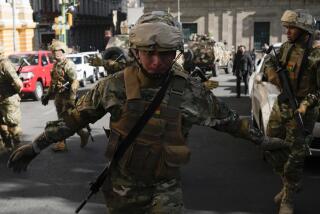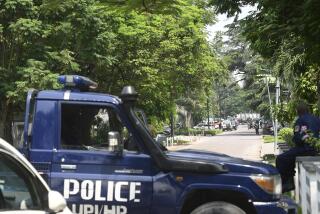Ivory Coast president battles on as rival’s forces close in
- Share via
Reporting from Johannesburg, South Africa — Ivory Coast’s defeated president, Laurent Gbagbo, staged a last stand in the commercial capital of Abidjan on Friday as his rival’s forces attacked his home, the presidential palace and two military bases.
With most of the top military commanders having deserted him, many observers said it was a matter of hours — days at most — before Gbagbo fell. His whereabouts were unknown.
Witnesses reported heavy fighting in Gbagbo’s upscale residential neighborhood of Cocody as the Republican Guard and loyal fighters battled to repel his rival’s forces.
One Cocody resident, Isidore Kouadio, 24, a student who lives 300 yards from the presidential palace, said in a phone interview that heavy fighting had been going on most of the night and all day, making it impossible to leave the house.
Gbagbo plunged his country into crisis when he refused to accept defeat by rival Alassane Ouattara in elections late last year that were certified by the United Nations. The head of the African Union, Jean Ping, called on Gbagbo to step down immediately to prevent further bloodshed.
The hard core of the Republican Guard and other loyal fighters is believed to number about 5,000. Kouadio said the Republican Guard was patrolling constantly in Cocody in army vehicles, with frequent gun battles erupting.
“The shooting began at about 10 p.m. But at about 3 o’clock in the morning we heard very heavy guns. We couldn’t sleep. And then again at 10 o’clock in the morning there was intense shooting. Even now, we can’t go out,” Kouadio said. “I’m really scared.”
Gbagbo, 65, a Sorbonne-educated history professor, was expected to make a long-promised address on state television Thursday evening but did not appear. He has made no comment since calling for a cease-fire earlier in the week, an appeal brushed aside by Ouattara.
Ouattara’s forces claimed to have taken control of Gbagbo’s residence and the state television network. Kouadio said Gbagbo’s state television went off the air late Thursday and hadn’t resumed broadcasting.
Ouattara declared a curfew late Thursday and closed all borders in a bid to prevent Gbagbo, his family and associates from fleeing. U.N. peacekeepers secured the airport, but international flights in and out of the country were canceled. Later Friday, Ouattara reopened air corridors.
In an offensive launched Monday, Ouattara’s forces took control of most of the country in a few days with few shots fired. Gbagbo’s army deserted in droves or switched sides.
Ouattara’s television station, TCI, based in the Golf Hotel where he and his government have been holed up since December, broadcast interviews Friday with several top military commanders who had switched to Ouattara’s side and urged other commanders to join them. They included the commander of the infantry, Gen. Firmin Detoh, and another senior officer, Col. Patrice Kouassi.
Other defections included the head of the military police, Gen. Edouard Tiape Kassarate, and a 100-member elite security force.
French forces were patrolling several districts of the city to halt looting and protect foreigners. About 500 foreigners, mainly French and Lebanese living in a neighborhood called Zone IV, took refuge in a French base.
The official U.N. tally of deaths in the postelection crisis is nearly 500, but a spokesman for the International Committee of the Red Cross in Geneva told journalists that the figure was more likely in the thousands.
Human rights organizations have accused Gbagbo forces and militias of crimes against humanity, in particular, killing immigrants from neighboring African countries. The U.N. said Friday that the pro-Ouattara forces were also committing grave abuses in western Ivory Coast, including looting, extortion, abductions and violence against civilians.
The U.N. says about 1 million Ivorians have fled their homes because of the violence.
More to Read
Sign up for Essential California
The most important California stories and recommendations in your inbox every morning.
You may occasionally receive promotional content from the Los Angeles Times.










